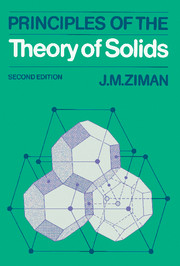Book contents
- Frontmatter
- PREFACE
- PREFACE TO THE SECOND EDITION
- Contents
- Chapter 1 Periodic Structures
- Chapter 2 Lattice Waves
- Chapter 3 Electron States
- Chapter 4 Static Properties of Solids
- Chapter 5 Electron-Electron Interaction
- Chapter 6 Dynamics of Electrons
- Chapter 7 Transport Properties
- Chapter 8 Optical Properties
- Chapter 9 The Fermi Surface
- Chapter 10 Magnetism
- Chapter 11 Superconductivity
- Bibliography
- Index
- Frontmatter
- PREFACE
- PREFACE TO THE SECOND EDITION
- Contents
- Chapter 1 Periodic Structures
- Chapter 2 Lattice Waves
- Chapter 3 Electron States
- Chapter 4 Static Properties of Solids
- Chapter 5 Electron-Electron Interaction
- Chapter 6 Dynamics of Electrons
- Chapter 7 Transport Properties
- Chapter 8 Optical Properties
- Chapter 9 The Fermi Surface
- Chapter 10 Magnetism
- Chapter 11 Superconductivity
- Bibliography
- Index
Summary
The Frontiers of Knowledge (to coin a phrase) are always on the move. Today's discovery will tomorrow be part of the mental furniture of every research worker. By the end of next week it will be in every course of graduate lectures. Within the month there will be a clamour to have it in the undergraduate curriculum. Next year, I do believe, it will seem so commonplace that it may be assumed to be known by every schoolboy.
The process of advancing the line of settlements, and cultivating and civilizing the new territory, takes place in stages. The original papers are published, to the delight of their authors, and to the critical eyes of their readers. Review articles then provide crude sketch plans, elementary guides through the forests of the literature. Then come the monographs, exact surveys, mapping out the ground that has been won, adjusting claims for priority, putting each fact or theory into its place.
Finally we need textbooks. There is a profound distinction between a treatise and a textbook. A treatise expounds; a textbook explains. It has never been supposed that a student could get into his head the whole of physics, nor even the whole of any branch of physics. He does not need to remember what he can easily discover by reference to monographs, review articles and original papers. But he must learn to read those references: he must learn the language in which they are written : he must know the basic experimental facts, and general theoretical principles, upon which his science is founded.
- Type
- Chapter
- Information
- Principles of the Theory of Solids , pp. v - viiPublisher: Cambridge University PressPrint publication year: 1972



